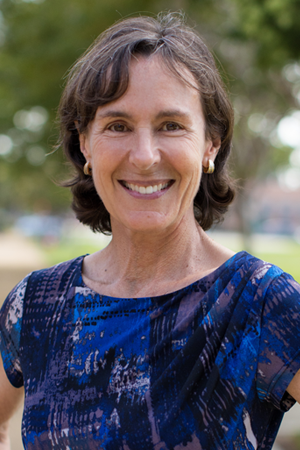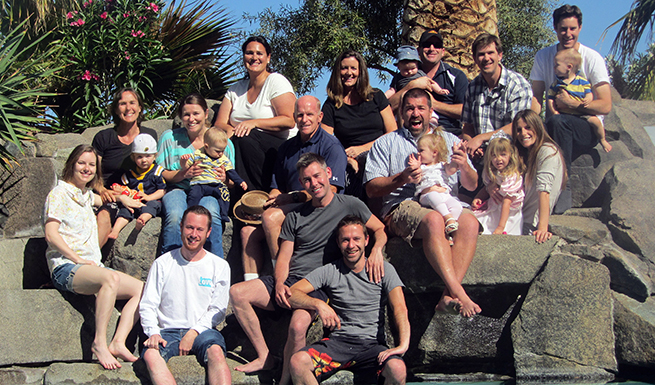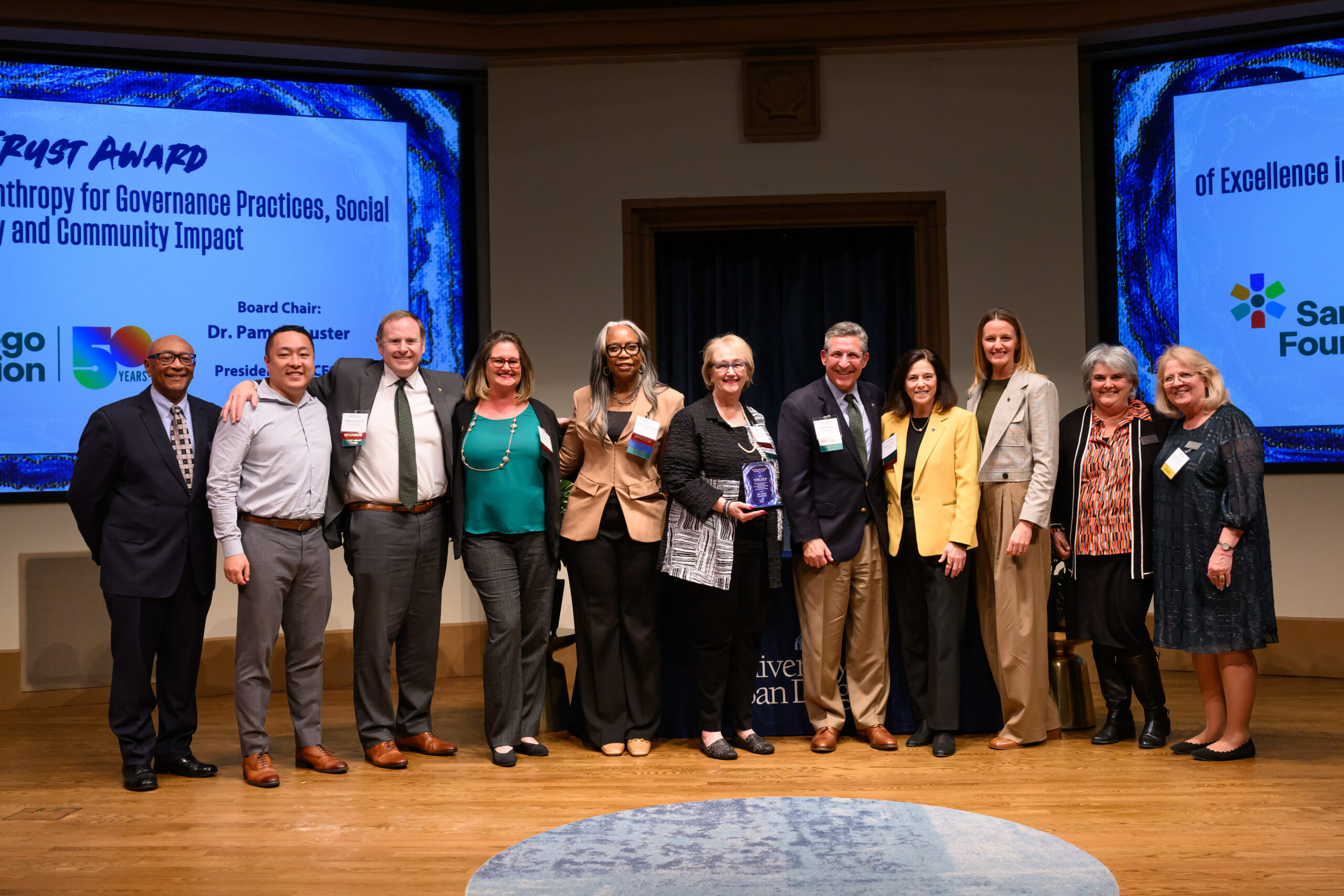Elisabeth Eisner Forbes is a firm believer in second chances.
“I don’t think anyone should be judged by the worst thing they ever did, let alone spend the rest of their life paying for it,” she declared.
That’s why Elisabeth spends much of her time mentoring young women who are struggling to make a fresh start.
“Everyone has a story, and our narratives can be changed,” she asserted. “We can help each other do that.”
When she’s not devoting time to her private law practice, teaching business law to first-generation college students at Southwestern Community College, or fulfilling responsibilities as a member of the Board of Governors at The San Diego Foundation, Elisabeth volunteers at many local organizations.
Especially during Women’s History Month, she tries to “pay it forward”, giving to young women the kind of encouragement and support that was given to her – encouragement to think deeply about their own stories – stories about where they fit into society and how they can contribute.
“It’s critical that we make room in our world to listen to one another’s stories,” she emphasized.
Don’t think of it as philanthropy
Her own story is one where she, too, struggled in her 20’s and finally found ground under her feet at 30. It was at that point that she returned to the values of generosity and humility instilled in her at a young age.
Her native-born Italian mother and U.S. soldier father met and married in Europe after World War II. Spending the first few years of her life in France, Elisabeth was exposed to different cultures and learned first-hand the importance of working together to help those in need following the war.

Some of her earliest memories are making and delivering care packages and babysitting young children when their parents were hospitalized. She describes her upbringing as one of building community and care.
“My folks would not have survived the war had it not been for the kindness of neighbors and family,” she shared. “They did not think of it as philanthropy. It was just people taking care of each other.”
With little money to their name, Bill and Leticia Eisner moved the family to Southern California so their children could pursue a better education. Largely due to a concerted effort by the U.S government to bolster a post-World War II American economy, Bill Eisner was educated, bought a home and found an engineering career, all on the GI Bill. He was able to bring his family into the middle class with the massive federal aid and assistance given to returning soldiers.
Elisabeth of course credits her parents’ hard work to her family’s rise, but she credits luck and timing too. She is grateful but is quick to recognize that people of color were not given the same opportunities to prosper. The GI Bill, as implemented, left out the vast majority of veterans of color.
“I feel very strongly that we don’t get to forget that – that the big middle class after the second world war was created with federal assistance, assistance that was not granted veterans of color,” she shared. “We need to do everything we can to level the deep inequities that exist in this country.”
Serving those who serve others
Racial and systemic injustices became clearer to Elisabeth as she entered adulthood. And as she has evolved into an accomplished corporate, finance and real estate attorney in San Diego, she expanded her philanthropic efforts to keep pace with her success.
Since opening her private practice in 2009, she has developed a strong specialty in federal and state laws applicable to nonprofit organizations, which includes advising nonprofit corporations in obtaining tax-exempt bond financing and providing advice with respect to credit enhancement facilities, letters of credit, and interest rate swap transactions.
She joined the San Diego Women’s Foundation to partner with other women in philanthropy seeking to address critical issues affecting the region. She was one of the co-founders and currently serves on the board of the San Diego Parks Foundation; she serves on the advisory council for the Salvation Army Adult Rehabilitation Center and as a volunteer for the Catalyst of San Diego & Imperial Counties Social Equity Collaborative Fund, which supports grassroots efforts to improve the economic, social, and physical well-being of San Diego County residents.
“My desire is to serve those who serve others,” she expressed.
Joining The San Diego Foundation
As one of the lawyers involved when The San Diego Foundation purchased its Liberty Station headquarters in 2009, Elisabeth, a long-time admirer of The Foundation’s work, became a natural fit to join the organization’s Finance Committee, on which she served for five years.
In 2014, Elisabeth joined The Foundation’s Board of Governors.
Also at that time, she and her husband, Brian Forbes, established their own donor-advised fund at The Foundation aligned with their passions – supporting programs and organizations that give young adults and adults an opportunity to transform their own lives by providing job training, job placement, re-entry into the workforce services, detox, drug and alcohol rehabilitation services, relapse prevention, and sober-living housing and similar programs.
Through the fund, the Eisner Forbes family has granted to Second Chance, Homeboy Industries, San Diego State University and several other institutions helping young people alter their narratives.
Her message to those looking to be more philanthropic is that there are more ways to get involved than by giving money. She believes everyone has amazing resources to contribute, whether that’s time, talent or treasure.
“I don’t think you have to be the leader of every team you serve on,” she said. “There’s so much need for people willing to roll up their sleeves and do the work. I strive to be that person.”
When Brian passed away in 2018, Elisabeth and her children – whom she describes as sophisticated and socially-conscious – established the Brian Forbes Memorial Scholarship Fund at The Foundation in his honor. Together, they award scholarships to local students who have participated in varsity sports and plan to attend a University of California college.
Looking ahead, Elisabeth has no plans to scale back her philanthropic efforts any time soon.
She feels the future of The San Diego Foundation is “remarkable”. She is especially excited about The Foundation’s new strategic priorities and growing collaborations with communities affected by systemic problems through the San Diego COVID-19 Community Response Fund, Black Community Investment Fund and other initiatives.
“The Board has adopted a vision for the future: just, equitable, and resilient communities. Mark Stuart has assembled a talented leadership team and the Board has focused The Foundation on racial and social justice, equity of opportunity, resilient communities and world-class philanthropy. Mark talks about getting at the root as well as the branches,” she said.
“I could not be more excited, honored and privileged to be a part of this organization at this time in its history,” Elisabeth exclaimed. “The Foundation is doing important, transformational work.”




